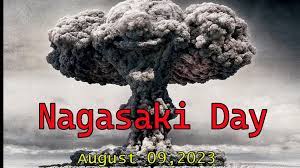Nagasaki Day

Nagasaki Day: On August 9th, 1945, America dropped an atomic bomb on the Japanese industrial city of Nagasaki during the final stages of World War II and 74,000 – 80,000 people were killed. Every year, Nagasaki Day is observed on 09 August in memory of the people killed in this tragedy. The atomic bomb dropped on Nagasaki was assigned the code name ‘Fat Man’.
Daily Current Affairs Quiz: August 2023
Devastation and Aftermath
Immediate Impact: The explosion demolished significant areas of Nagasaki, killing tens of thousands of people instantly. The intense heat and radiation unleashed by the bomb inflicted severe burns and injuries on survivors.
Long-Term Consequences: The survivors of the Nagasaki bombing, known as “hibakusha,” faced enduring health issues due to radiation exposure, including cancers, birth defects, and other ailments. The city itself was severely damaged, posing economic and social issues.
Global Response and Calls for Peace
Worldwide Outrage: The bombings of Hiroshima and Nagasaki generated worldwide outrage and debate about the morality of using such devastating weapons. Many questioned the ethics of targeting civilian populations and the long-lasting environmental and human consequences.
The Path to Peace: The horrors of Nagasaki and Hiroshima played a significant role in shaping the post-war world order. Efforts to avert further nuclear devastation culminated in the formation of organisations such as the UN and initiatives to promote disarmament and non-proliferation.
Commemoration and Lessons for the Future
Remembering the Victims: Nagasaki Day serves as a solemn remembrance of the lives lost and the suffering endured by the people of Nagasaki. Memorial ceremonies, peace rallies, and artistic expressions pay tribute to the resilience and spirit of the survivors.
Advocating for Peace: In the face of global tensions and the persistent threat of nuclear conflict, Nagasaki Day underscores the importance of pursuing diplomatic solutions, dialogue, and disarmament. It urges nations to prioritize cooperation, understanding, and the pursuit of a world free from the specter of nuclear warfare.
Conclusion
Nagasaki Day stands as a poignant reminder of the catastrophic impact of nuclear weapons and the urgent need to prevent their use in the future. As the world reflects on the tragic events of August 9, 1945, it is a time to recommit to the pursuit of peace, unity, and the preservation of human lives. By learning from the past and advocating for a world without nuclear weapons, we honor the memory of the victims and work towards a brighter, safer future for all.